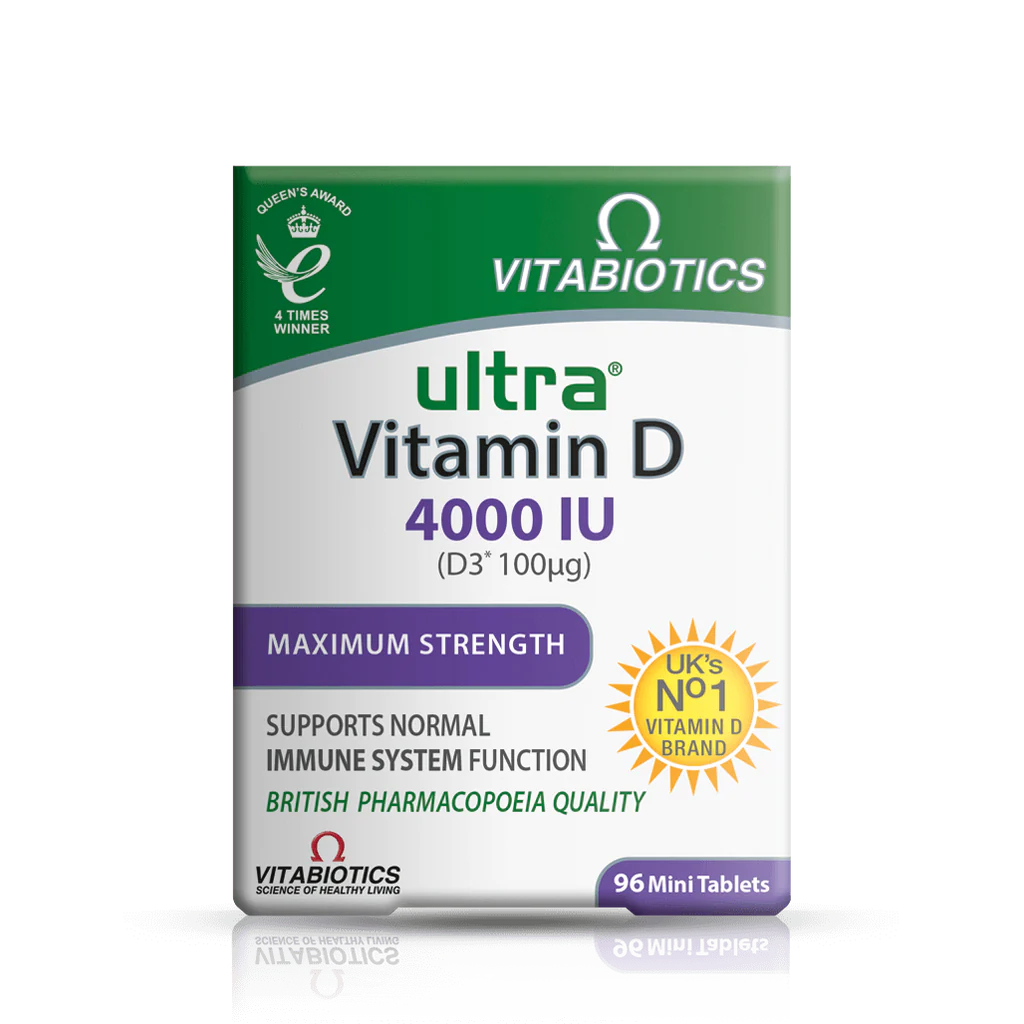Vitabiotics Ultra Vitamin D Maximum Strength 4000IU – 96 Tablets
£17.99
- Contains 75µg of vitamin D
- Ultra Vitamin D provides D3, which is the preferred form of vitamin D
- Vitamin D contributes to the normal function of the immune system
Ultra Vitamin D provides 400 IU vitamin D3. Safeguarding the diet with vitamin D is recommended to help maintain optimum levels throughout the year, especially winter months. This is particularly important for those who have restricted or limited exposure to the sun.
Only 5 left in stock

Discreet Packaging

UK Based
-
Vitabiotics Ultra Vitamin D 4000IU
Ultra Vitamin D provides 400 IU vitamin D3. Safeguarding the diet with vitamin D is recommended to help maintain optimum levels throughout the year, especially winter months. This is particularly important for those who have restricted or limited exposure to the sun.- Normal function of the immune system
- Normal absorption and utilisation of calcium in the body and the maintenance of normal bones and teeth
- Maintenance of normal muscle function
- Vitamin D has an important role in the process of cell division
What is Vitamin D and why do we need it?
Vitamin D helps regulate the amount of calcium and phosphate in the body. These nutrients are needed to keep bones, teeth and muscles healthy. A lack of vitamin D can lead to bone deformities such as rickets in children, and bone pain caused by a condition called osteomalacia in adults. The UK government recommends that everyone should consider taking daily vitamin D supplement during autumn and winter. People at high risk of not getting enough vitamin D, all children aged 1 to 4, and all babies (unless they’re having more than 500ml of infant formula a day) should take a daily supplement throughout the year.How much Vitamin D do I need?
From about late March/ early April to the end of September, the majority of people should be bale to make all the vitamin D they need from sunlight on their skin. Children from the age of 1 and adults need 10 micrograms of vitamin D a day. This includes pregnant and breastfeeding women, and people at risk of vitamin D deficiency. Babies up to the age of 1 year need 8.5 to 10 micrograms of vitamin D a day. A microgram is 1,000 times smaller than a milligram (mg). The word microgram is sometimes written with the Greek symbol μ followed by the letter g (μg). Sometimes the amount of vitamin D is expressed as International Units (IU). 1 micrograms of vitamin D are equal to 40 IU. So, 10 micrograms of vitamin D is equal to 400 IU.People at risk of Vitamin D deficiency
Some people will not make enough vitamin D from sunlight because they have very little or no sunshine exposure. The Department of Health and Social Care recommends that adults and children over 4 take a daily supplement containing 10 micrograms of vitamin D throughout the year if they:- Are not often outdoors – for example, if they’re frail or housebound
- Are in an institution like a care home
- Usually wear clothes that cover up most of their skin when outdoors
What happens if you take too much vitamin D?
Taking too many vitamin D supplements over a long period of time can causer too much calcium to build up in the body (hypercalcaemia). This can weaken the bones and damage the kidneys and the heart. If you choose to take vitamin D supplements, 10 micrograms a day will be enough for most people. Do not take more than 100 micrograms (4000 IU) of vitamin D a day as it could be harmful. This applies to adults, including pregnant and breastfeeding women and the elderly, and children aged 11 to 17 years. Children aged 1 to 10 years should not have more than 50 micrograms (2000 IU) a day. Infants under 12 months should not have more than 25 micrograms (1000 IU) a day. Some people have medical conditions that means they may not be able to safely take as much. If in doubt, you should consult your doctor. If your doctor has recommended you take a different amount of vitamin D, you should follow their advice. You cannot overdose on vitamin D through exposure to sunlight. But always remember to cover up or protect your skin if you’re out in the sun for long periods to reduce the risk of skin damage and skin cancer.













